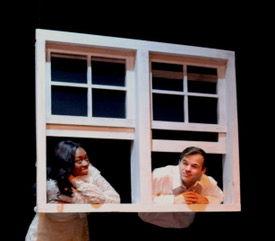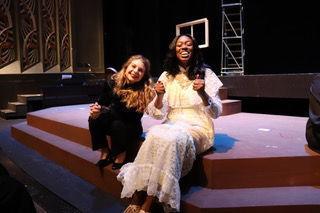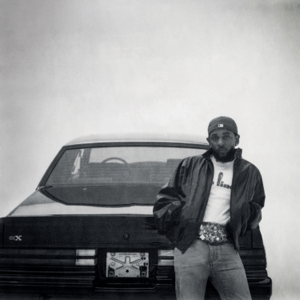The mythical Grover’s Corners comes to the University like never seen before.
Written in 1938 by Thornton Wilder, “Our Town” is a three-act play that tells the story of the New England town of Grover’s Corners over a span of twelve years through the daily lives of its citizens. The lead character, the stage manager, was separated into three characters that will be played by three different undergraduate students at the University – Marielle “Théo” Lambert-Scott, Fa’amaepaepa “Lilo” Laupola and Sydney Prochaska.
“‘Our Town’ has really made me focus on the things I take for granted in my everyday life,” Lambert-Scott said. “It’s a play that forces you to stop and smell the roses. Or in our case, the heliotrope.”
The play, directed by LSU theatre professor Dr. Shannon Walsh, required the transformation of the Shaver Theatre into a more interactive medium to allow for the stage movements and actor-audience interaction unique to the play.
“This is a show that I originally imagined in the Reilly Theatre,” Walsh said. “So, the first thing that I said to Jim Murphy who designed the set is ‘Okay, you have to make the Shaver into the Reilly for me.’ We sunk the pit and he built platforms over the pit so that you can come up-and-down off the stage, so we have actors that enter and exit into the audience. The stage managers can talk to the front row and then walk back up on stage.”
This is Walsh’s first time directing as an assistant professor at the University. She wanted to work with undergraduates for a long time because she believes that shows like this should provide opportunities for upperclassmen to go for bigger roles and freshman to be in the ensemble and learn what they need to do. Thus, she cast an astounding 29 actors for the play, something she had never seen before in her six years at the University.
“Undergraduates were coming to me expressing frustration that the process wasn’t quite what they expected, and so for me, I came in with not worrying so much about whether or not the show was going to be good but more about whether or not our students had a productive process that allowed them to grow and allowed them to feel that production was a safe space for risks,” Walsh said.
Walsh believes the play was meant to be a call to pay more attention to life and the simpler things — a message that, with the too-busy, Instagram-filled lives everyone leads, translates to today’s students.
“Translating it to today, the core of the piece that we went with was belonging and connection with where we’re sort of at in the world right now,” Walsh said. “That taking time to breathe and stop and notice things and put our phones down and notice each other became a driving force of the whole process, but also the way that we’re sort of delivering the show.”
As a director, Walsh also wanted to ensure the actors had the freedom to take risks and produce a unique iteration of the play. To achieve this, the actors are not playing age and are allowed to wear no makeup, making their characters their own.
Theatre junior Kain Gill, who has previously worked on a feature film and multiple short films, said this is his first time working as lead designer in an LSU Mainstage Production.
“A key feature of the costume design is that the actors were allowed to decide what they looked like from the neck up,” Gill said. “Any jewelry, hairstyles, piercings, etc. This is what people would look like if ‘Our Town’ was in a universe where people of different lifestyles and ethnicities were free to live as they want without fear of persecution.”
Walsh also wanted the play to resonate with University students. The play, like other School of Theatre productions, is funded by the entertainment fee that almost faced a budget cut not too long ago. Producing quality content that all students enjoy may be an integral part of making sure that fee is safe in the future.
“At least for now I think we’ve sort of salvaged our chunk of it but I don’t think that means that it’s done,” Walsh said. “We’re going to have to continue to fight for that fee, but I think that if we are doing work that is being supported by a student fee, then we need to continue to be really thoughtful that we’re putting on work that appeals to students, that appeals to the entire student body. And we’ve all worked really hard on this piece to make sure that it does that.”
“Our Town” will begin its run Feb. 13 through Feb. 24 in the Shaver Theatre, with a Pay What You Can Performance on Wednesday, February 13 at 7:30 p.m.and a $9 Preview Performance February 14 at 7:30 p.m.
LSU welcomes “Our Town” to the Shaver Theatre
By Lia Salime
February 12, 2019








